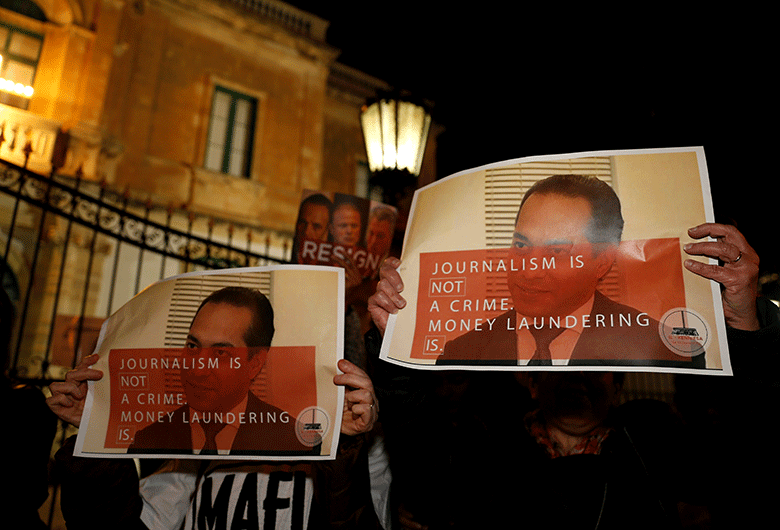Protesters hold up posters showing Pilatus Bank chairman Ali Sadr Hashemi Nejad while calling for the resignation of Malta’s police commissioner in March in light of his failure to investigate the bank following the assassination of anti-corruption journalist Daphne Caruana Galizia in October.
Speaking late last year at the Wealth 2.0 conference in London, an event dedicated to technological advances in wealth management, Ali Sadr Hashemi Nejad, the chairman of Malta’s Pilatus Bank, gave what his bank called “a sobering speech” on customer trust in the banking and fintech industries.
Describing it as the most important commodity in banking, Sadr said: “Trust comes from the high-touch when it comes to money and safekeeping.”
Three months on and trust in Sadr and Pilatus is in short supply. Sadr was arrested on March 19 in the US, charged with participating in an alleged scheme in which more than $115 million in payments for a Venezuelan housing complex were illegally funnelled through the US financial system for the benefit of Iranian individuals and entities, in breach of US economic sanctions against Iran.
Pilatus was not mentioned in the indictment, but the arrest prompted protests by anti-corruption activists outside the bank’s headquarters and, within days, Malta’s Financial Services Authority issued an order to remove Ali Sadr from his roles in Pilatus and forbade the bank from conducting any business until further notice.
Assassination
Pilatus had been a frequent target of Daphne Caruana Galizia, the Maltese investigative journalist who was assassinated in a car bomb attack in October. Former Pilatus employee Maria Efimova, who had acted as a source to Caruana Galizia on the Pilatus story, said in November that she had fled the country and that if she returned to Malta, she too would die. On the same day that Sadr was taken into custody, Efimova surrendered herself to Greek police, in response to a European arrest warrant filed against her by Maltese prosecutors.
Of this quick succession of events, Matthew Caruana Galizia, one of the journalist’s sons, tweeted: “The US Attorney’s action vindicates our mother’s work, but it has come at a terrible cost. One of our mother’s sources now sits in an Athens prison cell and our mother is dead.”
Much remains to unpack in this dramatic saga. The murder of Caruana Galizia and the Iran-related activities of Sadr alleged by US prosecutors are still little understood and may not be related.
But one thing is certain: few events could be as damaging to a bank’s reputation as those Pilatus has found itself embroiled. So much for the trust Ali Sadr so passionately spoke of.
Link to the source of information: www.euronews.com


 Signal2forex.com - Best Forex robots and signals
Signal2forex.com - Best Forex robots and signals




